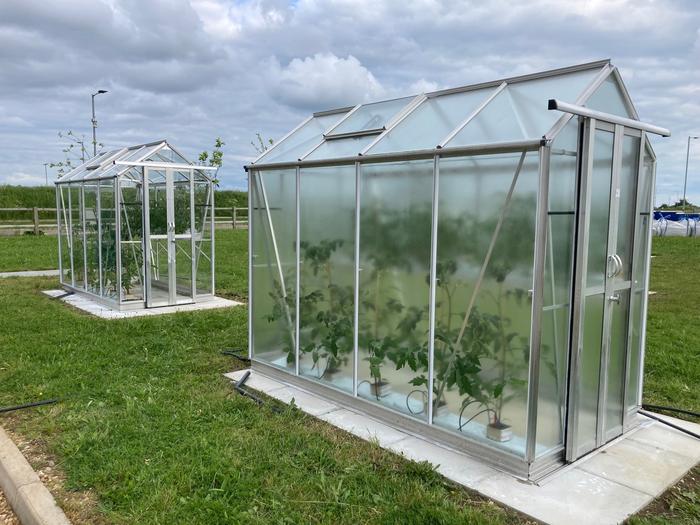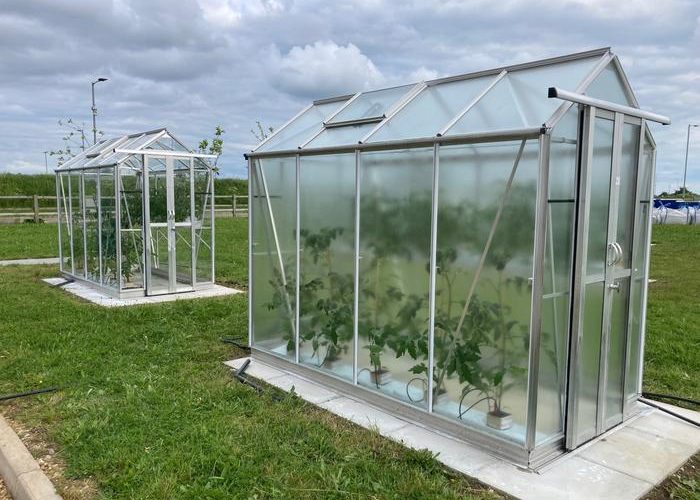UK scientists unveil light-optimising greenhouse coating to extend produce growing seasons

The innovative spray converts sunlight into red light, boosting crop yields and extending growing seasons in less sunny countries like the UK.


Growth of plants in greenhouses sprayed with the paint (right) was compared with that of plants in untreated greenhouses (left). Image credit: Lambda Agri
Researchers at the Universities of Bath and Cambridge, in collaboration with commercial partner Lambda Agri, have created an innovative spray coating for greenhouse glass that optimises light wavelengths to enhance plant growth and yield. This technology could help extend growing seasons in less sunny countries like the UK while reducing reliance on energy-intensive artificial lighting.
The UK’s short growing season, caused by its latitude and climate, forces the country to depend heavily on European imports of fruit and vegetables. These are often grown in large greenhouses that consume substantial amounts of electricity to maintain optimal growing conditions. However, the new spray coating technology offers a more sustainable alternative.
Transforming light for better growth
Photosynthesis, the process through which plants convert sunlight into energy, is most efficient when exposed to red light. However, sunlight is a mixture of all the colours in the spectrum, meaning much of it is not absorbed by plants and goes unused.
The new spray coats existing greenhouse glass like a varnish. This layer absorbs blue light from sunlight and converts it into red light, increasing the fraction of red light available to plants, which boosts crop yield.
“The way our coating works is similar to when you go to a nightclub and your gin and tonic glows under UV light,” explained Professor Petra Cameron from the University of Bath’s Institute of Sustainability and Climate Change (ISCC). “The quinine chemical in the tonic water is absorbing the UV and re-emitting it as visible light.
“Our coating contains molecules that absorb UV light from the sun and converts around 80-90 percent of it into red light, making photosynthesis more efficient, meaning we can grow more with less light.
“In field trials we’ve seen a nine percent increase in crop yield when growing basil in treated greenhouses. This means our technology could in the future be used to extend the growing seasons for produce and use less artificial light to get the same results, saving money and reducing the associated carbon emissions.”
Sustainable coating alternative
Existing technologies using similar approaches often rely on rare earth materials like indium, a costly and difficult-to-recycle metal. The Bath/Cambridge collaboration has developed a patent-pending alternative that uses more abundant, lower-cost materials.
The researchers have also utilised a chemical flow reactor to produce the materials, making the manufacturing process faster and more scalable.
Professor Dominic Wright from the University of Cambridge’s Inorganic and Materials Section in Chemistry described the significance of the innovation.
Professor Wright said, “This is a nice application of fundamental molecular science to an important, real-world problem, one that is particularly important in regards to the backdrop of food security and global warming.
“There is a very real prospect of this having a significant impact on the availability and cost of soft fruit and salad vegetables for consumers in the future, especially in northern European countries like the UK where the weather conditions are far from ideal.”
‘Far from ideal’ may be an understatement. The UK suffered heavily from the effects of climate change during the 2023-24 growing year, experiencing its wettest 18 months since Met Office records began in 1836. This led to waterlogged soils, farms underwater and disastrous harvest outcomes.
Data from the Department for Environment, Food and Rural Affairs (DEFRA) shows that vegetable yields decreased year-on-year by 4.9 percent, dropping to 2.2 million tonnes in 2023. Similarly, fruit production volumes fell by 12 percent, reaching just 585,000 tonnes.
Sweeter yields
In addition to boosting yield, the technology might also impact and improve the taste of crops. “There is even some evidence that suggests it improves the taste by raising the sugar content in the fruit,” said Professor Cameron.
The development has already received significant UK Government support, including £500k from DEFRA and £750k from DESNZ’s Net Zero Innovation Portfolio.
The team has submitted a patent for the greenhouse coating technology and hopes to make it commercially available to growers within the next few years.
Source: newfoodmagazine.com

